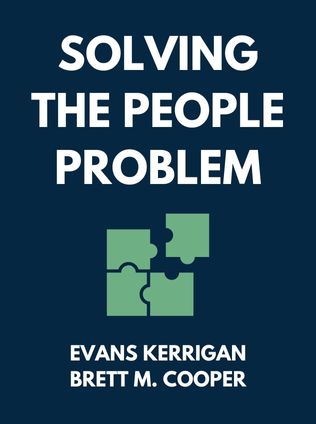
Solving the People Problem
Essential Skills You Need to Lead and Succeed in Today’s Workplace
By Evans Kerrigan, Brett M. Cooper
Published 09/2020
About the Author
Brett M. Cooper and Evans Kerrigan are distinguished experts in the field of leadership and team dynamics. Over the past two decades, they have influenced thousands of professionals across government sectors, non-profit organizations, and corporate America to foster more productive, effective, and humane work environments. As frequent speakers on topics such as team dynamics, leadership, and operational excellence, Brett and Evans bring a wealth of knowledge and practical insights to their audiences. Their book, Solving the People Problem: Essential Skills You Need to Lead and Succeed in Today’s Workplace, serves as a comprehensive guide to understanding and improving work relationships through the lens of emotional intelligence and personality styles.
Main Idea
In Solving the People Problem, Brett M. Cooper and Evans Kerrigan address the complex dynamics of modern work relationships. They assert that the key to leading and succeeding in today’s workplace lies in mastering emotional intelligence. By understanding how and why we and others behave in certain ways, we can adjust our interactions to foster better communication, collaboration, and productivity. Central to their approach is the DISC-EQ framework, which combines the DISC model of personality styles with the principles of emotional intelligence. This blend provides practical tools for improving self-awareness, managing emotions, and building strong, positive work relationships.
Table of Contents
- Introduction
- Finding the Framework to Make it Work
- Facing the Relationship Crisis in the Workplace
- The Solution Starts with You
- Knowing Yourself to Know Others
- The Solution, Part I: DISC-EQ
- The Solution, Part II: DISC
- Checking Your Gut
- It's Not Just Words
- The Right Kind of Disagreement
- Making the Team Work
- Working with Those Outside Your Circle
- Leadership Is a Relationship
- Conclusion
Introduction
Effective leadership is a challenge for both seasoned managers and newcomers. Despite decades of experience, many leaders still struggle to communicate effectively and inspire their teams. The traditional focus on being the best individual contributor often leaves new leaders ill-prepared for the interpersonal demands of leadership. The authors emphasize that true leadership requires an understanding of how others think and feel, enabling leaders to encourage meaningful contributions from their team members.
Finding the Framework to Make it Work
Work relationships are inherently complex, and the solutions to these complexities often lie within our emotions. Emotional intelligence, defined as “the ability to identify and manage one’s own emotions, as well as the emotions of others,” is crucial in the modern workplace. Despite its importance, emotional intelligence is frequently overlooked in favor of new systems and technologies aimed at boosting productivity.
The authors argue that to effectively lead and communicate, one must harness emotional intelligence to understand personal and others' behaviors. This understanding allows for adjustments in actions and reactions, creating an environment conducive to success. A framework is needed to explain human behavior and provide practical solutions to interpersonal issues, thus bridging the gap between emotional needs and workplace demands.
Facing the Relationship Crisis in the Workplace
Solving the people problem involves building emotionally authentic interactions. Genuine, trust-filled work relationships are dwindling as communication increasingly occurs through screens rather than face-to-face interactions. For employees to thrive and produce great results, they must feel valued as individuals with unique personalities and preferences. Meeting both their emotional and rational needs is essential for creating a supportive and effective work environment.
The Solution Starts with You
Emotionally healthy organizations begin with emotionally healthy leaders. Self-awareness of one’s personality style, comfort zones, and limitations is the first step. Leaders must also learn to read others' needs and preferences, considering these differences in their decision-making and communication. Understanding underlying emotions helps resolve conflicts and fosters a collaborative atmosphere. Introspection strengthens leaders, making them more adaptable and empathetic, thereby improving their ability to connect with others.
Knowing Yourself to Know Others
Diverse perspectives and styles are invaluable to a team, offering a broad range of solutions and strategies. Recognizing and respecting these differences allows team members to contribute their best. However, the gap between self-perception and how others see us often exacerbates workplace problems. Building healthy relationships requires prioritizing self-awareness, which in turn enhances flexibility, empathy, and connection with others.
The Solution, Part I: DISC-EQ
The DISC-EQ framework combines two well-established concepts: DISC, the language of personality style, and EQ, emotional intelligence. Emotional intelligence, popularized by Daniel Goleman in his 1996 book Emotional Intelligence, involves skills and insights that help manage oneself and build positive relationships. Understanding one’s style, thoughts, actions, and behaviors is fundamental to self-awareness. This knowledge, when applied to understanding others, facilitates navigating difficult situations and fostering productive work relationships.
Sign up for FREE and get access to 1,400+ books summaries.
You May Also Like
The Subtle Art of Not Giving a F*ck
A Counterintuitive Approach to Living a Good Life
By Mark MansonRich Dad Poor Dad
What the Rich Teach Their Kids About Money - That the Poor and Middle Class Do Not!
By Robert T. KiyosakiHow To Win Friends and Influence People
The All-Time Classic Manual Of People Skills
By Dale CarnegieQuiet: The Power of Introverts
The Power of Introverts in a World That Can't Stop Talking
By Susan Cain



















